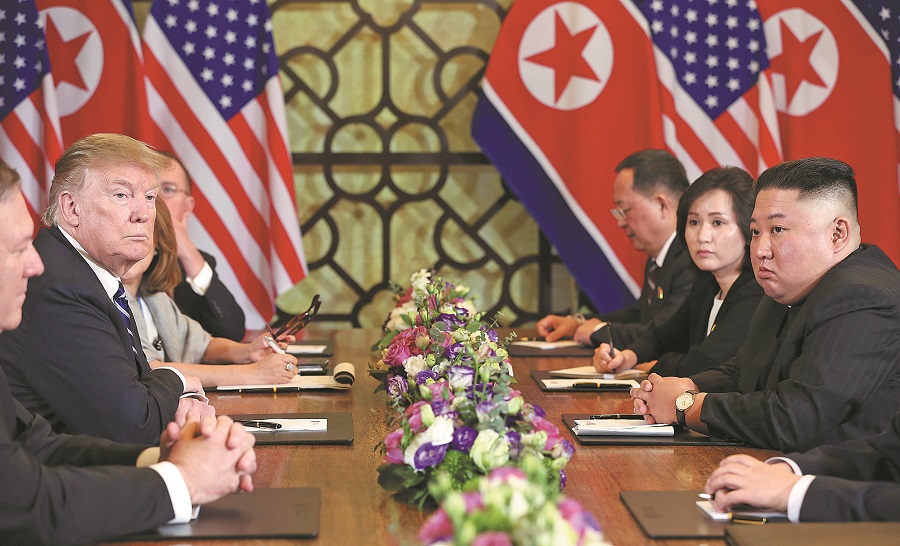Washington to remain in touch with Pyongyang
By LIU XUAN/ZHOU JIN/PAN MENGQI | China Daily | Updated: 2019-03-02 07:01

US officials who briefed the Chinese government in a phone call on Friday about the DPRKUS summit, which ended on Thursday without an agreement, said that they will remain in contact with the Democratic People's Republic of Korea, according to a statement released by China's Foreign Ministry on Friday.
United States Secretary of State Mike Pompeo made the commitment during the phone conversation with Yang Jiechi, a member of the Political Bureau of the Communist Party of China Central Committee.
Pompeo said the US will continue trying to resolve the Korean Peninsula issue through dialogue and negotiation. He said the US appreciated China playing a positive role and would like to maintain communication and coordination with China, according to the ministry's release.
Yang, who is also director of the Office of the Foreign Affairs Commission of the CPC Central Committee, said that the Korean Peninsula issue is complicated and cannot be solved overnight, the statement said.
China hopes the US and the DPRK will be patient and meet each other halfway to unremittingly advance peace talks and strive for new achievements, Yang said. China will continue to play a constructive role on the issue, he added.
The much-anticipated second DPRK-US summit ended abruptly on Thursday afternoon, an outcome analysts said resulted mainly from a lack of trust between Pyongyang and Washington. The analysts, however, are still optimistic about further negotiations. The US and DPRK gave contradictory accounts afterward.
DPRK officials held an impromptu middle-of-the-night news conference at a Hanoi hotel on Friday, offering an explanation that differed from Trump's.
"What we proposed was not the removal of all sanctions, but the partial removal," DPRK Foreign Minister Ri Yong-ho said in Hanoi. He said the DPRK sought relief from five UN sanctions imposed in 2016 and 2017, out of a total of 11, in exchange for disabling its main nuclear complex.
On Thursday, US President Donald Trump said at his own news conference that Kim "wanted the sanctions lifted in their entirety, and we couldn't do that".
Ri said that in exchange for partial sanctions relief, Pyongyang was willing to "permanently and completely dismantle all the nuclear material production facilities in the Yongbyon area, including plutonium and uranium, in the presence of US experts". In addition, Ri said Pyongyang would also put a "permanent halt" to nuclear and long-range missile testing "in order to lower the concerns of the United States".
"However, during the meeting, the United States insisted that we should take one more step besides the dismantlement of nuclear facilities in the Yongbyon area," Ri said. "Therefore, it became crystal clear that the United States was not ready to accept our proposal."
Foreign Ministry spokesman Lu Kang said lifting the sanctions and denuclearization should be considered simultaneously and resolved together, especially when both sides think sanctions removal is a key part of the denuclearization process.
Li Chengri, a researcher at the Chinese Academy of Social Sciences, said the peninsula issue cannot be resolved in one or two summits and future negotiations can be expected between the two sides.
Zha Daojiong, a professor at Peking University, agreed and said it is "desirable for future meetings to be held between the two sides", and they will "somehow try to resolve their differences peacefully".
Moon Jae-in, president of the Republic of Korea, said on Friday that his administration "will closely communicate and cooperate" with the United States and the DPRK "so as to help... reach a complete settlement by any means".
He also said Seoul will discuss with Washington the possibility of restarting joint inter-Korean economic projects, such as their joint industrial complex, according to the Seoul-based Yonhap News Agency.
























